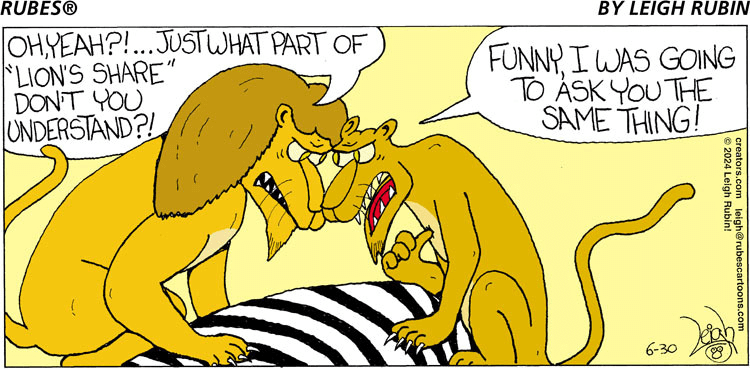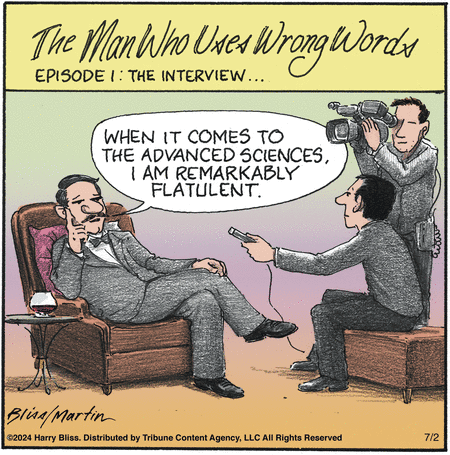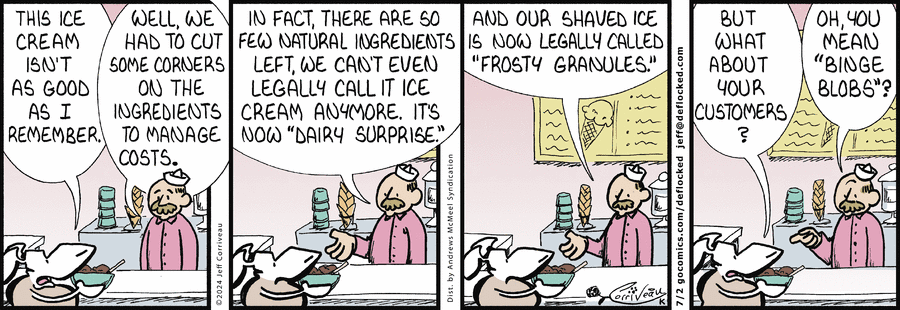CSotD: The Lion Always Gets His Share
Skip to comments
Sunday’s Rubes (Creators) brought to mind an African folktale whose more precise origin I can’t remember, of the lion, the hyena and the jackal forming a partnership to hunt together.
They were quite successful and ended up with a great pile of game. Lion directed Hyena to divide it up for them, and he made three equal piles. “Explain this division,” Lion said, and Hyena replied, “This pile is for Jackal, this pile is for me and that pile is for you.”
With that the Lion roared and attacked Hyena, sending him screaming away in bloody flight. Lion then ordered Jackal to make the division.
“The division is already made,” Jackal said. “This pile is for you, this other pile is for you and that pile is for you.”
Lion was pleased. “How did you become so wise?” he asked.
“I watched what you did to Hyena.”

The story of the Lion’s Share brings us to this more contemporary story in Non Sequitur (AMS).
I went to college in South Bend, Indiana, a few years after Studebaker, a major employer there, went bust, which included the dissolution of its pension system. As a result, you saw old women — widows of Studebaker employees — flipping burgers at an age when they could barely shuffle around behind the counter, or acting as maids in the dormitories.
It was sobering, but Congress stepped in and passed a law guaranteeing pensions, though not retroactively.
Some years later, the company I worked for dropped their pension system in favor of a 401k in which they would make a 2-for-1 match for whatever I invested.
Later, it became a 1-for-1 match. Then it became a tax-deferred savings account to which Corporate contributed nothing.
So if you see someone my age searching for loose change on the beach, think of Hyena and Jackal, to whom Lion offered a similar opportunity.

Betty (AMS) had an excellent story arc about AI, which begins here.
She nailed it in this episode, and as someone with a large number of friends and business associates who are “art nerds,” I have to say I liked AI better when it was producing people with three arms and seven fingers and suchlike, because what I’m seeing on social media now is harder to distinguish from hyper-realistic art. Though I didn’t like it back when it was easier to pick out, either.
Each technological advance hurts someone. Mechanical looms hurt weavers and printing put a lot of clerks out of work. For decades after photography began, newspapers and magazines couldn’t print photos and relied on artists to convert them into detailed drawing, but that era soon ended.
Still, there was always a difference between Margaret Bourke-White or Ansel Adams and your cousin with a Brownie camera, and nobody would mistake a photograph for a Chagall.
AI, however, is busily destroying the joy of finding an amazing photograph, because any jackass with a computer can order up the sort of image a real photographer might wait a lifetime to capture.

And today’s Betty shows a genuine threat to the cartoonists who have discovered second careers in children’s books, though I got a laugh out of her reaction.
On one level, Sturgeon’s Law is an eternal truth: Ninety percent of everything is crap. That certainly applies to children’s books written by celebrities, which have the sales potential of a mayfly. Good work survives.
Then again, compare the 1966 Chuck Jones version of “How the Grinch Stole Christmas” with what Ron Howard produced in 2000 or any version of “Alice in Wonderland” with whatever that was that Tim Burton extruded.
Improvements in technology cannot replace art, even in competent hands.
What will our great-grandchildren be reading when publishers discover they don’t have to pay artists or writers anymore?
Maybe, if we raise them right, they’ll be wandering in the woods like the rebels of “Fahrenheit 451,” carrying ancient copies of real books and wearing hand-spun, hand-woven artisanal clothing.
Juxtaposition of the Day


First of all, there are two kinds of people in this world: Those who interrupt people to correct their grammar or usage and those who grit their teeth and focus, instead, on the thoughts being expressed.
That’s a concise explanation of why people despise grammar nazis, and, as someone who has made a living with words, I’m allowed to say it.
The example in Bliss, however, also brings up an issue of journalistic ethics, because when someone makes such an absurd error, your choices are:
- Print it as they said it, which is often a sneaky way to make someone you dislike sound stupid.
- Use the quote, but correct the usage, which is dishonest.
- Sigh and scrap the quote as unusable, and try to get by with a summary instead.
However, in private conversation, it is my position that interrupting someone with a correction is rude, and particularly over something as pedantic as ending a sentence with a preposition, which is one of those fussy, made-up rules that doesn’t reflect the English language.
As it happens, Churchill didn’t coin the famous quote on the topic, but the Quote Examiner not only looks at the matter in depth but cites an example from a 1944 Australian newspaper that ropes in Harry Bliss’s gag as well:

Also, while it’s obvious in print, I defy anyone to distinguish “could’ve” from “could of” when spoken, which is no doubt the source of the error.
I defer to the master, and he must be right because I read it in a book:



I wish Mamet were wrong in this Deflocked (AMS), but I, too, have noticed how ice cream has changed over the years, and was even witness to one part of the degradation.
Ben & Jerry’s used to have a bodacious stockholder’s meeting each year that included free ice cream, booths from a variety of non-profits and, the year I attended, Maria Muldaur.
However, at that meeting, they asked stockholders to approve a poison-pill to keep the company from being acquired. The investors, despite their Birkenstocks and overall grooviness, voted it down amid complaints about wanting to get dividends.
The company was acquired in 2000, and is now being sold again and welcome to the straight world.
Sigh. I remember when drug stores dispensed the real stuff:

Comments 9
Comments are closed.